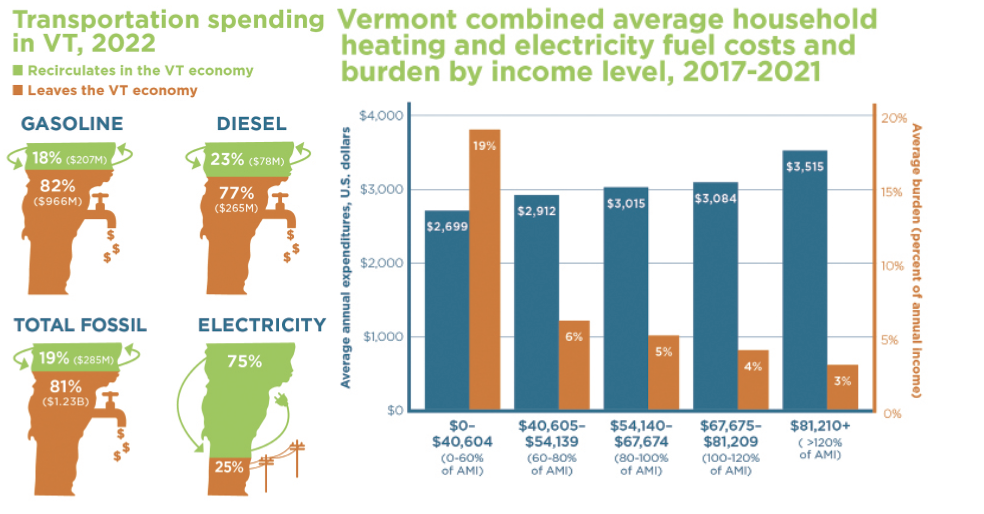
A new report from the non-profit Energy Action Network (EAN) finds that Vermont has made the least progress of any state in the Northeast toward the Paris Climate Accord emissions reduction commitment made by the U.S. and is not on track to meet its own state legal obligations by 2025 and 2030 under the Global Warming Solutions Act.
Vermont has the second highest per capita emissions in New England, behind only New Hampshire, and the third highest in the Northeast, with only Pennsylvania and New Hampshire creating more climate pollution per person. Looking internationally, Vermont’s per capita climate pollution is more than twice as high as the global average and is significantly higher than most countries.
“Not only does Vermont have a legal obligation and a moral responsibility to do our part in reducing the climate pollution that we create,” said Jared Duval, executive director of the Energy Action Network and an appointed member of the Vermont Climate Council, “doing so is also a massive opportunity to save Vermonters money and strengthen our state economy.”
Vermonters collectively spent about $2.6 billion on fossil fuels in 2022, with about $2 billion of that total draining directly out of the state economy.
High energy costs place a particular burden on households with lower and middle incomes.
In contrast, cleaner and more efficient technologies such as electric vehicles and heat pumps offer significant consumer savings over the life of the equipment and also keep a far higher share of energy dollars recirculating locally while doing more to support Vermont jobs, EAN stated.
The report found that Vermont will almost certainly not meet its responsibility—or fully seize the available economic benefits for all Vermonters—unless durable policy and regulatory action in line with Climate Action Plan recommendations are adopted.
The report comes in the wake of continued international scientific warnings, including from the chair of the Intergovernmental Panel on Climate Change (IPCC), who stated earlier this year that “we are walking when we should be sprinting” when it comes to reducing greenhouse gas emissions. The flooding that hit much of Vermont this summer further highlights the significant financial and social costs of not following science-based policy recommendations, according to the report.
“EAN’s Annual Progress Report is the best single overview of energy issues available,” said Senator Christopher Bray, chair of the Senate Natural Resources and Energy Committee. “I know of no organization that gathers more information and distills it into a more useful format in this state than the Energy Action Network.”
Among the new analysis in this year’s report is a comparison between energy used by fossil fuel equipment versus more efficient electric alternatives. Specifically, electric vehicles use about four times less energy than gas vehicles because they are much more efficient at transferring energy to propulsion and do not experience the same heat and engine losses as gas vehicles.
Similarly, cold climate heat pumps are, on average, nearly three times as efficient as fossil fuel-based heating systems, since heat pumps transfer heat from the air or ground rather than generate it from combustion.
These energy savings can translate into significant cost savings. For instance, compared to the current $3.80 per gallon average price for gasoline, the cost of charging an electric vehicle (EV) is the equivalent of only about $1 per gallon in most of Vermont—and EVs also have lower maintenance costs than fossil fueled vehicles.
Additionally, federal, state, and utility incentives now often bring the upfront price of new or used EVs down lower than the cost of comparable gas vehicles. The report shares similar consumer data about heating, with heat pump water heaters, heat pumps, and advanced wood heating systems all enabling sizable fuel cost savings and often costing less up front to install than fossil options, after incentives — all while keeping more money in Vermont.
To ensure that all Vermonters can access pollution-reducing, money-saving options, the report highlights the importance of equitable design of policies and incentives to prioritize Vermonters with lower incomes, in particular.
EAN produces the Annual Progress Report for Vermont on Emissions, Energy, Equity, and the Economy to help ensure that statewide energy and climate conversations are grounded in and guided by the latest and highest quality data and analysis.
The report was unveiled and first presented at EAN’s Annual Summit Sept. 28.
For more information and to read the full report, visit: eanvt.org.




